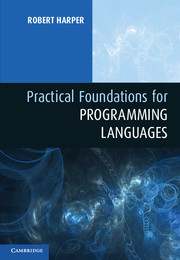Book contents
- Frontmatter
- Contents
- Preface
- Part I Judgments and Rules
- Part II Statics and Dynamics
- Part III Function Types
- Part IV Finite Data Types
- Part V Infinite Data Types
- Part VI Dynamic Types
- Part VII Variable Types
- 20 Girard's System F
- 21 Abstract Types
- 22 Constructors and Kinds
- Part VIII Subtyping
- Part IX Classes and Methods
- Part X Exceptions and Continuations
- Part XI Types and Propositions
- Part XII Symbols
- Part XIII State
- Part XIV Laziness
- Part XV Parallelism
- Part XVI Concurrency
- Part XVII Modularity
- Part XVIII Equational Reasoning
- Part XIX Appendix
- Bibliography
- Index
22 - Constructors and Kinds
from Part VII - Variable Types
Published online by Cambridge University Press: 05 February 2013
- Frontmatter
- Contents
- Preface
- Part I Judgments and Rules
- Part II Statics and Dynamics
- Part III Function Types
- Part IV Finite Data Types
- Part V Infinite Data Types
- Part VI Dynamic Types
- Part VII Variable Types
- 20 Girard's System F
- 21 Abstract Types
- 22 Constructors and Kinds
- Part VIII Subtyping
- Part IX Classes and Methods
- Part X Exceptions and Continuations
- Part XI Types and Propositions
- Part XII Symbols
- Part XIII State
- Part XIV Laziness
- Part XV Parallelism
- Part XVI Concurrency
- Part XVII Modularity
- Part XVIII Equational Reasoning
- Part XIX Appendix
- Bibliography
- Index
Summary
The types nat → nat and nat list may be thought of as being built from other types by the application of a type constructor, or type operator. These two examples differ from each other in that the function space type constructor takes two arguments, whereas the list type constructor takes only one. We may, for the sake of uniformity, think of types such as nat as being built by a type constructor of no arguments. More subtly, we may even think of the types ∀(t · τ) and ∃(t. τ) as being built up in the same way by regarding the quantifiers as higher-order type operators.
These seemingly disparate cases may be treated uniformly by enriching the syntactic structure of a language with a new layer of constructors. To ensure that constructors are used properly (for example, that the list constructor is given only one argument and that the function constructor is given two), we classify constructors by kinds. Constructors of a distinguished kind T are types, which may be used to classify expressions. To allow for multiargument and higher-order constructors, we also consider finite product and function kinds. (Later we consider even richer kinds.)
The distinction between constructors and kinds on one hand and types and expressions on the other reflects a fundamental separation between the static, and the dynamic phase of processing of a programming language, called the phase distinction. The static phase implements the statics, and the dynamic phase implements the dynamics.
- Type
- Chapter
- Information
- Practical Foundations for Programming Languages , pp. 170 - 178Publisher: Cambridge University PressPrint publication year: 2012

